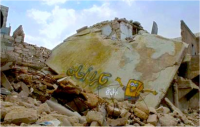
By STAND Senior Manager Kathleen Fallon
“Tomorrow will be more beautiful.”
This is the rough translation of “Bokra ahla,” an Arabic message scrolled onto the remains of a sandy-colored brick building in Aleppo. Like many, many buildings in Aleppo, it is now no more than rubble on the ground.
It is a message of hope, in a country where hopelessness could easily become overwhelming. Next to the graffiti is a picture of a goofy Spongebob Squarepants waving his arms. Humor, just like hope, will not be killed.
This spirit of Syria is undying. From the spray-paint that lined the wall of a school in Dara’a back in March 2011, igniting the revolution, to this graffiti, drawn onto debris: it’s in the voices of peaceful protesters and community leaders, who so rarely receive global attention, but are the backbone of the revolution.
A friend of mine is one of these unsung heroes. He was studying journalism at the University of Damascus, and graduated as the revolution in Syria was just gaining momentum. Right after graduating, he was offered a position at the national Syrian television channel, but turned it down because of their skewed reporting. When I lived in Damascus, he was the one who first taught me phrases in Iraqi colloquial Arabic, to help me seem “cooler.” He was the epitome of hope for Syria, participating in peaceful protests since they began and risking his life to create facebook groups to coordinate the movement.
A week ago, on February 4th, he sent me an email:
“i dont want to leave my country during this hard time, but after the last attack on my Village it became too dangerous because the checkpoints start arresting people who belong to that village and some of them got killed and others disappeared.
i was threaten by the regime once and i paid some money to solve that and right now i have the same problem again i am wanted for them… i dont wanna be armed because i am against killing for any reason but i wanna do something to support the people now living under fire i wanna tell the world what’s going on here. i mean, i am not running away.”
The day after he sent that email, he was arrested by the Assad regime’s security forces.
It often feels hopeless to sit thousand of miles away, looking at youtube videos of bombings and a twitter feed of stats. For so many of us, from Syrian activists to American students, it is almost as hard to watch what is happening in Syria as it is to not watch.
But at the end of the day, we cannot give up on solidarity. We cannot give up on raising money to assist refugee camps, and pressing our government for a policy that prioritizes humanitarian action. We cannot give up on advocacy and action.
No matter how many shellings, or political prisoners, the spirit of the revolution will not die. No matter how many children are killed on the streets, no matter how many women are brutally raped and stigmatized, no matter how many communities are ripped apart, no matter how many winding alleyways crumble. No matter how few jasmine flowers bloom in Damascus, the “city of jasmine,” this spring, the spirit that sparked the revolution will not die.
So amidst the ever-changing policy question marks, let’s not give up on the spirit of hope in Syria. It lives on in people all over Syria, in the victims and the heroes, who are more often than not one and the same.
